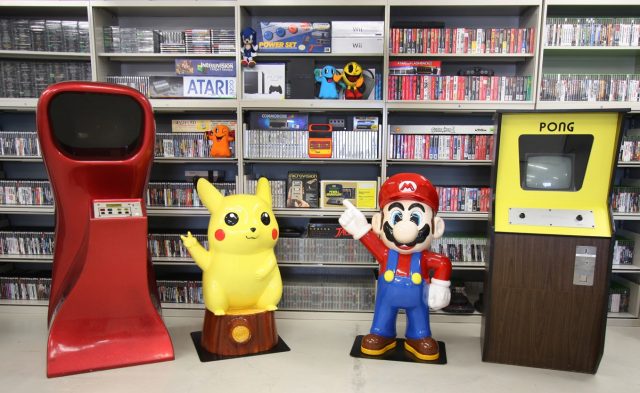
Orrich Lawson | Getty Images | Gottlieb
In recent years, video game preservationists, librarians, and historians have been pushing the boundaries of the DMCA, which allows emulated versions of physical game collections to be legally shared with remote researchers over the Internet. They have argued for exemption. But these conservationists continue to face pushback from industry groups. Industry groups are concerned that this exemption could provide a legal loophole for “online arcades,” allowing members of the public to have widespread access to copyrighted classic games for free and legally. ing.
The long-running debate was re-entered earlier this month during livestreamed testimony before the Copyright Office, which is considering new DMCA rules as part of its regular triennial process. In their testimony, representatives from the Software Preservation Network and Library Copyright Alliance assured that access to temporary remote games “will be granted primarily for personal research, scholarship, and educational purposes.” He defended his proposal for a “individual human review” system that would help , or research. ”

But lawyer Steve England, representing the Entertainment Software Association trade group, said the new proposal “doesn't move much” on the proponent's side and is “incomplete at best.” And when asked what constitutes “complete” protection enough to satisfy the ESA, Mr. England hesitated.
“At this time, I don't think there is a combination of restrictions that ESA members would support to provide remote access,” Englund said. “Conservation organizations want a lot of discretion in dealing with highly valuable intellectual property. They still… He has not shown any desire.”
interfere with research
Research institutions can now provide remote access to digital copies of works such as books, movies, and music through certain DMCA exemptions issued by the Copyright Office. However, there is no similar exception that would allow temporary digital copies of video games to be sent to interested researchers. This means that a museum like the Strong Museum of Play can only access its extensive gaming archives if researchers physically visit the site in Rochester, New York.

At a recent Copyright Office hearing, industry attorney Robert Rothstein tried to argue that this amounts to a “travel issue” rather than a legal issue requiring new rulemaking. But New York University professor Layne Nooney countered that the need to travel is a “significant economic and logistical obstacle to conducting research.”
For Nooney, getting from New York City to the Strong Museum in Rochester takes five to six hours by car “on a good day,” plus an overnight stay because the research costs more than a small fortune. He says it's necessary. Part of a day. Because of this, Nooney has had access to the Strong Collection only twice in his career. For researchers who live far away, or for graduate students and researchers who don't have as much funding, even a single research visit to the mighty might be out of reach.
“You don't just go there to play games for a few hours,” Nooney said. “Frankly, my colleagues who do literary studies and film history research have fairly routine and regular access to digitized versions of the objects they study…These obstacles are a reality. discipline in a way that is unfair to researchers in other fields.”
Limited access

At the hearing, attorney Kendra Albert said preservationists were working remotely to “find a compromise between the ESA's concerns and the need for flexibility that we have emphasized on behalf of the preservation community.” He said he proposed the idea of having humans review requests for access. ” They compared the proposed system to one already in use for granting access to library “special collections” that are not widely available to all members of the public.
But while preservation institutions may want to provide limited academic access, “in the real world, people want to preserve access to play games for fun,” England said. he insisted. He pointed to public comments made to the Copyright Office by “individual commenters.” [who] 'I'm very interested in playing games for fun' is evidence that some people are willing to exploit this type of system.
Even if “Ivy League” libraries are responsible for proposed DMCA exemptions, less scrupulous organizations can easily lie about their interest in “academic play” by forcing online “checkboxes” on the public. Mr. England worried that he might just offer it. If a human verified the checkbox, England argued, it could provide a legal loophole for widespread access to unrestricted online arcades.
Are some restrictions enough?

Phil Salvador of the Video Game History Foundation said England's concerns about the score were overblown. “Building a video game collection is a specialized skill, and most libraries don't have the human labor, expertise, resources or even interest,” he said.
Salvador estimated that the number of institutions that can build physical collections of historic games is in the “single digits.” And that's before you consider the large amount of resources required to provide remote access to these collections. Rhizome Preservation Director Dragan Espenschied runs the sophisticated cloud-based emulation infrastructure necessary for hundreds of users to access his Emulation as a Service art archive and gaming retrospective. He said it would cost the organization “several thousand dollars a month.”
Salvador also cited a VGHF study from last year that found that a whopping 87 percent of games ever released are out of print, and that researchers were able to uncover vast swaths of video game history without institutional assistance. He said this makes it difficult to access. And the games that are most interesting to researchers tend to be the earlier games that are “more primitive” and “less popular,” so they are less likely to be re-released in the modern era, Salvador said. .
The Copyright Office is expected to rule on the preservation community's proposed exemption later this year. But at this point, there is some frustration that the industry has not accepted any of the significant compromises that preservationists feel have been made to address these potential concerns.
“None of this is enough to reassure these rights holders that there will be no harm,” Albert said at the hearing. “If we're talking about practical realities, what I really want to emphasize is that advocates continue to propose compromises to ensure that preservation institutions can provide researchers with the access they need. It's not clear to me whether that's enough.” ”


